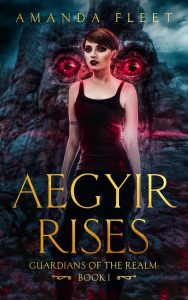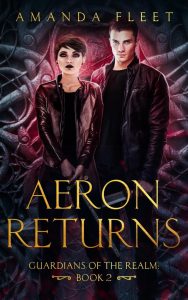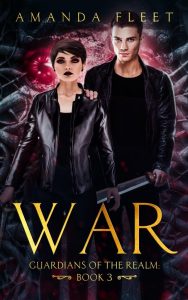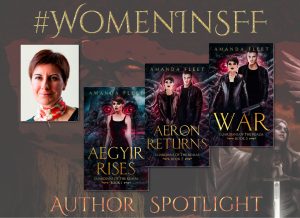Women in SFF Author Spotlight – Amanda Fleet (THE GUARDIANS OF THE REALM)
Amanda Fleet is a physiologist by training and a writer at heart. She spent 18 years teaching science and medicine undergraduates at St Andrews University, but now uses her knowledge to work out how to kill people (in her books!).
She has been an inveterate stationery addict since a child, amassing a considerable stash of fountain pens, ink and notebooks during her lifetime. These have thankfully come in useful, as she tends to write rather than type, at least in the early stages of writing a book.
During her time at St Andrews, she worked with the College of Medicine in Blantyre, Malawi. While in Malawi, she learned about the plight of the many street children there and helped to set up a Community Based Organisation that works with homeless Malawian children to support them through education and training – Chimwemwe Children’s Centre. It was this experience that helped to inspire the Malawian aspects in her novel “The Wrong Kind of Clouds” (though, of course, the book is entirely fictional).
She is the author of the urban fantasy trilogy: “The Guardians of The Realm”, published in early 2020, a crime novel “The Wrong Kind of Clouds” and the psychological thriller “Lies That Poison”.
Amanda lives in Scotland with her husband, where she can be found writing, walking and running.
Welcome to the Hive, Amanda Fleet. Let’s start small: tell us about a great book you’ve read recently!
When lock down started (I’m in Scotland), I struggled to read anything. My head was in such a different place. You’d have thought that burying myself in fantasy would have been perfect, but it just wasn’t happening. I ended up reading a lot of books in a genre I never read – romance – and I’m not sure I’d recommend many of them for a “Women in SFF” blog! But before lock down, I read the first three of SM Reine’s Preternatural Affairs books and really enjoyed them. The main character is Cèsar Hawke, who is a witch, working for the government in the Office of Preternatural Affairs. They deal with crimes committed by witches/demons/necromancers and so on – the non-human criminals of the world.
We can absolutely relate with the struggle to focus during these difficult times, and suggesting a change in genre is a great idea!
 Okay, time to escalate things: reality warps and you suddenly find yourself leading a D&D-style party through a monster-infested dungeon. What character class are you, and what’s your weapon of choice?
Okay, time to escalate things: reality warps and you suddenly find yourself leading a D&D-style party through a monster-infested dungeon. What character class are you, and what’s your weapon of choice?
Okay. Well… First things first… maybe hard to believe, but I’ve never had any D&D experience at all, so had to Google what you’re on about here. I found a couple of sites that went through the different character classes and to be honest, I haven’t a scoobies about any of it. Despite quite a lot of people dying in my books, in reality, I’m generally quite a quiet, peaceful lass who tries to look out for others, so cleric?
Seriously, I can’t answer this question! I genuinely have no clue.
When you’re not trawling through dungeons, how do you like to work? (In silence, with music, or serenaded by the damned souls of a thousand dead shrimps? Do you prefer to type or to hand-write? Are you an architect or a gardener? A plotter or a pantser? D’you write in your underwear, or in a deep-sea diver’s suit?)
Tell us a little bit about your writing method!
Now, this I can answer! ?
The ‘writing process’ usually starts with the vaguest of ideas or questions. For one of my crime novels, this was “Why do you believe what one person says, more than you do another?” For the fantasy trilogy, this was, “What if you were made up of three parts: a physical body, your character, and the energy needed to run it? What happens to those three bits when you die?” This morphed into demons that could steal that energy out of you by putting their hand into your chest and grabbing it (and killing you).
After that initial vague thought, I spend a lot of time (a few weeks usually; although for one book this is now into two years) throwing ideas around and thinking about it all. Even at this point, I can often see some scenes incredibly clearly, and I may write them (even if they subsequently have no place in the final book!). All of this brainstorming is done in a giant notebook, with handwritten notes (and usually a fountain pen because writing with one doesn’t make my wrist ache, whereas writing in biro does). I always think better with a pen in my hand. Usually, the plot starts to become more concrete and the characters emerge at this point.
I then spend a good chunk of time getting to know my characters – I have pages of notes on them – from early childhood experiences onwards. Most of which never makes it into the book, but helps me to see them and know what makes them tick.
Likewise, the setting gets a heap of notes too, though perhaps less so than the plot and characters.
I’m definitely more of a plotter than a pantser (in case you couldn’t tell). Once I’ve got the major ideas about plot, character and setting sorted, I try and write my ‘beat sheets’ – the key points in the novel. A lot of this is still on paper – I have some template print-outs I made where I can fill out the key points of these scenes and make notes of what needs to happen between them. The actual detail of the scenes in between is more fluid though. And of course, sometime the characters rebel and want to take the plot off in an entirely different direction!
When I finally start writing the thing for real, I get those key scenes down as documents in Scrivener, with an idea of how many scenes there might be in between them. Before I write a scene, I spend a bit of time planning it (pen and paper again, in the giant notebook). Sometimes I write with music – I can have a set playlist for a book that is just on repeat, and all of the tracks are ones that make me think of the book in some way. More recently, I’ve tended to write with no music. I sit or stand at my desk, which looks out over part of the garden. When I first started writing full-time (i.e. after I quit my job!), I ‘dressed up for work’ and wore a lot of my work clothes, to try and remind myself that this was my job now (I used to be a university lecturer), but nine times out of ten now, I throw on something comfy enough for writing, but decent enough I can answer the door without embarrassing either me or whoever’s on the doorstep! Walking trousers or similar. Almost invariably trousers. I’m not a skirts and dresses woman, really!
What (or who) are your most significant female fantasy influences? Are there any creators whom you dream of working with someday?
I suppose Sarah Fine would be my biggest influence. After I read her Guards of the Shadowlands trilogy, I thought “God, I wish one day I could write something like this!” The plot and setting were so different and I just adored the characters.
As for creators I’d dream of working with one day… I don’t know. Patrick Ness and Neil Gaiman are huge heroes of mine, so perhaps a project with them. But I’m such small fry, I’d be the one making the coffee… that would be my input to the project! So maybe I dream of being big enough fry that I would work on a project with them and not just be making the coffee.
 What was the last thing you watched on TV and why did you choose to watch it? Alternatively, what games have you enjoyed recently?
What was the last thing you watched on TV and why did you choose to watch it? Alternatively, what games have you enjoyed recently?
Well, we don’t have Sky or Netflix or Amazon TV or any of those things, so what’s available to watch on TV is a much more limited palette, and I’m not the biggest TV person in the world anyway. One thing I could watch over and over would be Farscape. I binge-watched that this Spring (I have the DVDs). The mix of characters is fantastic and the humour cracks me up all the time. Watching all of it, it was amazing to see the different relationships develop. Not just Crichton and Aeryn, but Crichton and D’Argo, who started out not getting on and end up best friends.
Things that have been on TV that I enjoyed? There’s been a series of Alan Bennett’s ‘Talking Heads’ on recently that are brilliant. If you ever want a masterclass on how to draw a character through dialogue, watch them. They’re 30 minutes long or so, and yet within the first few sentences, you know exactly what the character is like.
The world shifts, and you find yourself with an extra day on your hands during which you’re not allowed to write. How do you choose to spend the day?
Ooh. I think I’d split it up across a number of things. If lock down is over and we’re actually allowed to go out for coffee, I would meet up with various friends I haven’t seen in the flesh for months, especially a couple of friends over in Glasgow. If this day also has ever-expanding time, I’d also do some gardening, and watch some videos on You Tube I’ve bookmarked. If my Achilles wasn’t in the middle of a massive flare-up, I’d also go for a long run (~10 km/6-7 miles, which is long for me). And if there was any time left over, I’d do some drawing, because I’ve just not found time to do that recently.
It sounds like you’d need a second day off to recover from the first!
Can you tell us a little something about your current work(s) in progress?
At the moment, I’m about 70K words into the first draft of the fourth book in the Guardians of The Realm series. It’s set five years after the end of the initial trilogy. The two main characters, Aeron and Faran have had a relatively quiet few years (after spending the trilogy battling demons), but a new threat to The Realm has emerged; one where being a warrior doesn’t help to defeat it. Their relatively settled life is thrown upside-down as all of the training they have and all of the skills they possess mean nothing against a foe that can warp your mind and turn you against your own army.
When that goes off to my editor, I’m hoping to spend a bit of time on the book that’s been brewing for a couple of years, which is set in the wilds of Scotland and draws on some Celtic mythology of cailleachs (though more on the weather deity and creator deity aspects than the old hag aspects). I’ve been chewing over this one for at least two years, but The Realm books have always demanded more attention, so maybe I’ll get a chance to play with it while my editor has the other book.
What’s the most (and/or least) helpful piece of writing advice you’ve ever received?
Most helpful? That the first draft of a book is the most terrible version of that book, and is mostly you telling yourself what they story is about. After that draft, it only gets better.
The least? Write every day. After hitting burnout and almost having a breakdown (the reason I quit my well-paid, great pension etc. job to earn almost nothing!), I’ve learned how to listen to my body a lot more. Making myself write every day when my brain needs a break is a sure-fire way to make me hate what I’m writing.
Every writer encounters stumbling blocks, be it a difficult chapter, challenging subject matter or just starting a new project. How do you motivate yourself on days when you don’t want to write?
If it’s genuinely just procrastination and not my brain needing a break, I switch my laptop to airplane mode for a start. It’s too easy to muddle ‘oh, today the writing is challenging’ and ‘I’m too easily distracted by social media’! If my brain genuinely just needs a break, I go for a walk or do something else like gardening or knitting or drawing. Sometimes my brain then says ‘You know what, I’d quite like to write just a little bit, after all’ and that’s fine. But on the days it doesn’t, it doesn’t.
If I’m just procrastinating, I try and get rid of distractions and set myself a 30-minute timer. If I still really don’t want to write after 30 minutes, then I stop, but more often than not, doing 30 minutes of focused work gets me back into it and I keep going.
If I’m stumbling over a scene or chapter, I move on and come back to it. Because I’m a planner, I don’t have to write the book in order (and I usually don’t). So, if a scene is being a pain, I skip ahead to another one that seems clearer to me, and come back to the tricky one later.
 If you could visit any country at any point in history, where/when would you go, and why?
If you could visit any country at any point in history, where/when would you go, and why?
Ooh, tricky one. Because if you go back in history, the plight of women is almost invariably even crapper than it is now, regardless of the country, and I’d be taking my modern, emancipated, feminist self there, so there’d be trouble! I also swear quite a bit, which might not go down well. For most periods in history, there are the ‘haves’ and the ‘have-nots’, and the ‘have-nots’ have a terrible life, generally. But even for a woman in the ‘haves’ group, it’s not exactly always brilliant, is it? If I was just going as a tourist – to have a look and come back… I think I’d like to know why the stone circles were built, so maybe I’d go back to somewhere like Calanais (Callanish) at the time of their building and find out.
Who are your favourite female characters in literature or pop culture? And do you have a favourite type of female character you enjoy writing?
I like sassy women who don’t take much crap and who can handle themselves. Thankfully, these are becoming more common in books and pop culture! My favourite would of course be Aeryn Sun from Farscape – strong, knows her own mind, doesn’t take any nonsense, but (eventually) learns to trust others and let go a bit. I enjoy writing that kind of character.
Tell us about a book that’s excellent, but underappreciated or obscure.
Well, I loved The Gargoyle by Andrew Davidson, but I know a lot of people couldn’t get into it. For me, it was one of the best things I’d ever read!
But if you’re really wanting something obscure (and great), then The Sound of a Wild Snail Eating by Elisabeth Tova Bailey would be my recommendation!
Finally, would you be so kind as to dazzle us with an elevator pitch? Why should readers check out your work?
People are dying in Cumbria. Lots of people. It appears to be a flu outbreak. Except no one tests positive for any virus known to man. And there appears to be a serial killer on the loose too. Bodies keep appearing in secluded areas, but there’s no obvious cause of death.
Meanwhile, Reagan Bennet is being plagued by dreams of a different world. Ones where she’s a warrior called Aeron. Ones where a woman keeps urging her to come home because it’s not a plague that’s killing everyone, but the demon Aegyir. Ones where she’s sentenced to hang for being a traitor.
Aegyir is real. And he believes Reagan is his old enemy Aeron. One he’d sworn to destroy.
Reagan needs to figure out who Aegyir is, before they slaughter everyone she loves. And to do that, she needs to figure out who she really is.
Thank you so much for joining us today Amanda! You can find out more about Amanda’s books at any of these places:
Website | Facebook | Twitter | Amazon.com | Goodreads | Bookbub – @AmandaFleet


Ah, brainstorming with fountain pens… my favourite bit. Do you pick an ink to go with the story, colour-code wildly, or just go with whatever happens to be in the pen?